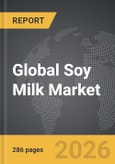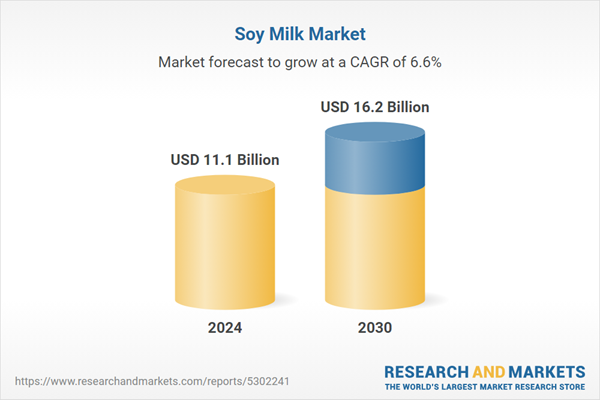Global Soy Milk Market - Key Trends and Drivers Summarized
What Makes Soy Milk Stand Out Among Dairy Alternatives?
Soy milk has carved a niche for itself as a standout option among plant-based dairy alternatives, driven by its unique nutritional profile, versatility, and taste that closely resembles traditional dairy milk. Produced by soaking, grinding, and boiling soybeans, soy milk has a rich and creamy texture that makes it a preferred choice for consumers who want a non-dairy option without compromising on mouthfeel. What truly differentiates soy milk from other plant-based options is its protein content, which rivals that of cow's milk, providing around 7 grams of protein per cup, a level not easily matched by other alternatives like almond, oat, or rice milk. This high protein content makes soy milk particularly appealing to vegetarians, vegans, and health enthusiasts looking to maintain muscle mass and meet daily protein requirements without relying on animal-based sources. Additionally, soy milk naturally contains an array of essential vitamins and minerals such as calcium, vitamin D, and vitamin B12 - often fortified to enhance its nutritional profile - ensuring that it delivers the same benefits as dairy milk. Beyond its nutritional advantages, soy milk is celebrated for its functional versatility. Its ability to froth and maintain stability in high temperatures makes it a popular choice for specialty coffee beverages like lattes and cappuccinos, a quality not easily replicated by many other plant-based milks.Why Are Consumers Choosing Soy Milk Over Dairy?
The shift from traditional dairy to soy milk is being fueled by a multitude of factors, encompassing dietary preferences, health concerns, and ethical considerations. A significant portion of the global population, approximately 68%, experiences some degree of lactose intolerance, making soy milk a reliable alternative that provides similar nutrients without the adverse digestive effects. Additionally, as plant-based diets become increasingly popular, soy milk is becoming a core component for individuals striving to reduce their consumption of animal products. From an environmental standpoint, the production of soy milk is far more resource-efficient compared to traditional dairy farming, requiring significantly less water, land, and energy. This environmental advantage has resonated strongly with eco-conscious consumers who prioritize products that contribute to reducing their carbon footprint. Furthermore, the ethical implications of dairy production, particularly concerns over animal welfare and the intensive nature of factory farming, have led many consumers to seek alternatives that are perceived as more humane. These ethical and environmental motivations are reinforced by growing awareness of health risks associated with excessive dairy consumption, such as increased cholesterol levels and a higher risk of certain cancers. Soy milk, being naturally free from cholesterol and lower in saturated fats, provides a compelling argument for consumers looking to make healthier dietary choices.How Are Innovations Shaping the Soy Milk Market?
Technological advancements and product innovation are reshaping the landscape of the soy milk market, making it more competitive and aligned with evolving consumer expectations. Traditional concerns surrounding the distinctive 'beany' flavor of soy milk have been addressed through innovations in production techniques, such as enzyme treatment and ultra-high temperature (UHT) processing, which help to eliminate undesirable notes and produce a smoother, more neutral taste. As a result, soy milk has become more palatable to a wider demographic, including consumers who previously avoided it due to taste concerns. The industry has also responded to the demand for enhanced nutritional offerings by fortifying soy milk with added proteins, omega-3 fatty acids, and functional ingredients like probiotics, which cater to diverse dietary needs, including those of athletes, seniors, and children. These developments have transformed soy milk into more than just a dairy alternative; it now offers targeted health benefits that address specific consumer goals such as gut health, heart health, and immune support. Packaging innovation has also played a crucial role in boosting soy milk's popularity. The introduction of shelf-stable tetra packs and resealable containers has extended its shelf life, making it a convenient option for on-the-go consumption and reducing food waste. The proliferation of single-serve options and flavored varieties has made soy milk a more attractive choice for busy professionals, students, and families. Also, with the rise of café culture, specialty barista blends have been developed to meet the specific requirements of the coffee industry, ensuring that soy milk complements espresso-based drinks without separating or curdling.What Is Driving Growth in the Soy Milk Market?
The growth in the soy milk market is driven by several factors that mirror changes in consumer behavior, dietary patterns, and technological advancements. One of the primary growth drivers is the rising prevalence of lactose intolerance and milk allergies, which has created a substantial demand for alternatives that are both nutritious and safe for consumption. The trend towards plant-based diets, fueled by a growing interest in wellness and sustainability, has further propelled soy milk's popularity. This shift is not just limited to vegans and vegetarians; flexitarians - individuals who consciously reduce their meat and dairy intake - are also embracing soy milk as a healthier, more eco-friendly option. Another key factor contributing to market expansion is the increasing consumer preference for clean-label and non-GMO products. Manufacturers are responding by developing soy milk options that are organic, free from artificial additives, and produced using sustainable farming practices, meeting the expectations of a more discerning consumer base. The role of technology in the market's growth cannot be understated; advancements in food processing have significantly improved the taste, texture, and nutritional value of soy milk, making it a more competitive alternative to both traditional dairy and other plant-based milks. Moreover, the rapid expansion of e-commerce and direct-to-consumer sales channels has made soy milk more accessible to a global audience, allowing niche and specialty brands to reach consumers who previously had limited access. Lastly, the diversification of soy milk applications into products such as plant-based yogurts, cheeses, ice creams, and ready-to-drink protein shakes has expanded its appeal beyond the beverage category, enabling soy milk to capture a larger share of the plant-based dairy market. This multifaceted growth trajectory reflects a confluence of changing consumer preferences, innovative product development, and strategic market positioning, ensuring that soy milk remains a prominent player in the evolving landscape of plant-based nutrition.Report Scope
The report analyzes the Soy Milk market, presented in terms of market value (US$ Thousand). The analysis covers the key segments and geographic regions outlined below.- Segments: Product Type (Flavored, Plain); Application (Beverages, Cheese & Snacks, Desserts).
- Geographic Regions/Countries:World; United States; Canada; Japan; China; Europe (France; Germany; Italy; United Kingdom; Spain; Russia; and Rest of Europe); Asia-Pacific (Australia; India; South Korea; and Rest of Asia-Pacific); Latin America (Argentina; Brazil; Mexico; and Rest of Latin America); Middle East (Iran; Israel; Saudi Arabia; United Arab Emirates; and Rest of Middle East); and Africa.
Key Insights:
- Market Growth: Understand the significant growth trajectory of the Flavored Soy Milk segment, which is expected to reach US$9.4 Billion by 2030 with a CAGR of a 7%. The Plain Soy Milk segment is also set to grow at 6% CAGR over the analysis period.
Why You Should Buy This Report:
- Detailed Market Analysis: Access a thorough analysis of the Global Soy Milk Market, covering all major geographic regions and market segments.
- Competitive Insights: Get an overview of the competitive landscape, including the market presence of major players across different geographies.
- Future Trends and Drivers: Understand the key trends and drivers shaping the future of the Global Soy Milk Market.
- Actionable Insights: Benefit from actionable insights that can help you identify new revenue opportunities and make strategic business decisions.
Key Questions Answered:
- How is the Global Soy Milk Market expected to evolve by 2030?
- What are the main drivers and restraints affecting the market?
- Which market segments will grow the most over the forecast period?
- How will market shares for different regions and segments change by 2030?
- Who are the leading players in the market, and what are their prospects?
Report Features:
- Comprehensive Market Data: Independent analysis of annual sales and market forecasts in US$ Million from 2024 to 2030.
- In-Depth Regional Analysis: Detailed insights into key markets, including the U.S., China, Japan, Canada, Europe, Asia-Pacific, Latin America, Middle East, and Africa.
- Company Profiles: Coverage of players such as Alpro, Eden Foods, Inc., Kikkoman Corporations, Organic Valley, PUREHARVEST and more.
- Complimentary Updates: Receive free report updates for one year to keep you informed of the latest market developments.
Some of the 52 companies featured in this Soy Milk market report include:
- Alpro
- Eden Foods, Inc.
- Kikkoman Corporations
- Organic Valley
- PUREHARVEST
- Soy Fresh
- SunOpta Inc.
- The Hershey Company
- Vitasoy International Holdings LTD
- WhiteWave Foods
This edition integrates the latest global trade and economic shifts into comprehensive market analysis. Key updates include:
- Tariff and Trade Impact: Insights into global tariff negotiations across 180+ countries, with analysis of supply chain turbulence, sourcing disruptions, and geographic realignment. Special focus on 2025 as a pivotal year for trade tensions, including updated perspectives on the Trump-era tariffs.
- Adjusted Forecasts and Analytics: Revised global and regional market forecasts through 2030, incorporating tariff effects, economic uncertainty, and structural changes in globalization. Includes historical analysis from 2015 to 2023.
- Strategic Market Dynamics: Evaluation of revised market prospects, regional outlooks, and key economic indicators such as population and urbanization trends.
- Innovation & Technology Trends: Latest developments in product and process innovation, emerging technologies, and key industry drivers shaping the competitive landscape.
- Competitive Intelligence: Updated global market share estimates for 2025, competitive positioning of major players (Strong/Active/Niche/Trivial), and refined focus on leading global brands and core players.
- Expert Insight & Commentary: Strategic analysis from economists, trade experts, and domain specialists to contextualize market shifts and identify emerging opportunities.
Table of Contents
Companies Mentioned (Partial List)
A selection of companies mentioned in this report includes, but is not limited to:
- Alpro
- Eden Foods, Inc.
- Kikkoman Corporations
- Organic Valley
- PUREHARVEST
- Soy Fresh
- SunOpta Inc.
- The Hershey Company
- Vitasoy International Holdings LTD
- WhiteWave Foods
Table Information
| Report Attribute | Details |
|---|---|
| No. of Pages | 286 |
| Published | February 2026 |
| Forecast Period | 2024 - 2030 |
| Estimated Market Value ( USD | $ 11.1 Billion |
| Forecasted Market Value ( USD | $ 16.2 Billion |
| Compound Annual Growth Rate | 6.6% |
| Regions Covered | Global |









